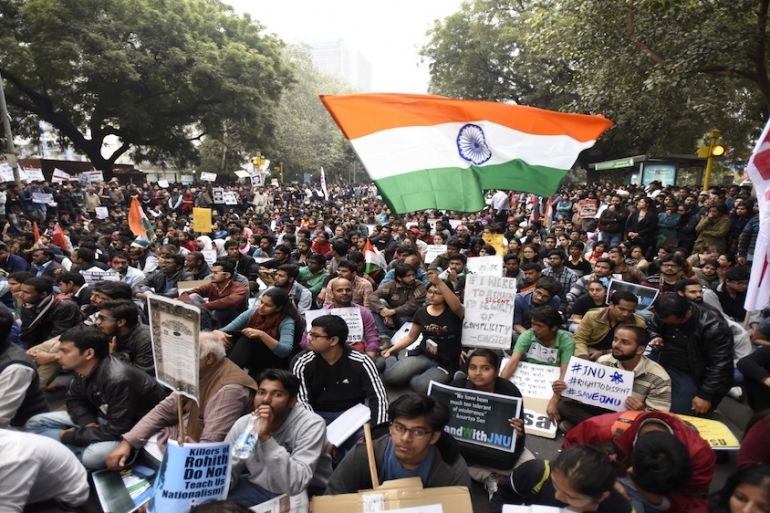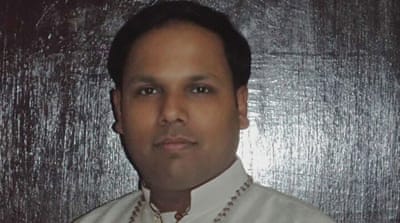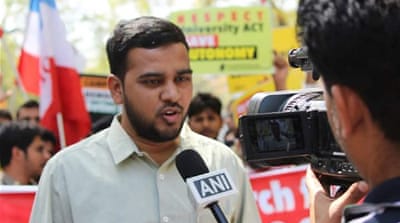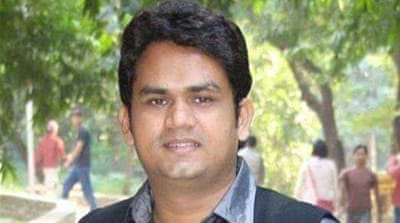Sounding out Indian youth leaders
Al Jazeera speaks to four youth leaders across the ideological spectrum to hear their opinions on four burning issues.

As the developed world struggles with problems associated with ageing societies, developing countries are confronted with challenges of the opposite kind: Millions of their citizens are coming of age, completing their higher education and trying to join the workforce and achieve a decent livelihood.
According to United Nations estimates, nine out of 10 young people live in less developed countries.
The State of the World’s Population report of 2014, produced by the UN Population Fund, said 28 percent of India’s population was between the ages of 10 and 24.
This youth bulge is putting enormous pressure on the Indian economy and is being blamed for everything from caste unrest, rural migration to crimes against women.
Writing recently in The New York Times, Somini Sengupta, the newspaper’s UN correspondent and author of The End of Karma: Hope and Fury Among India’s Young, said: “Nowhere can the pressures … be felt as profoundly as in India. Every month, some one million young Indians turn 18 – coming of age, looking for work, registering to vote and making India home to the largest number of young, working-age people anywhere in the world.”
Against this backdrop of rising economic aspirations and growing demands for equality of opportunity, female equality and civil liberties, Al Jazeera spoke to leaders of the youth wings of organisations that cut across the Indian political spectrum to gauge their opinions on four specific issues.
Corruption is widely cited as a major cause for concern by young Indians. Do the youth leaders believe that funding of political parties by businesses is exacerbating the problem?
The issue of Kashmir is a very sensitive one in the country. A UN Security Council resolution in 1948 demanded a plebiscite to decide the status of Kashmir. However, the resolution has been on the backburner ever since, with the region divided between India and Pakistan, neighbouring countries that have fought four major wars since 1947. Do the youth leaders believe the people of Jammu and Kashmir have a right to self-determination?
After Indonesia, India has the biggest population of Muslims. We asked the youth leaders to what extent do they hold the Indian media responsible for fostering the impression of a link between Muslims and terrorism.
Finally, we asked them about violence against women in India. The fatal Delhi gang rape of a 23-year-old student shook the nation in 2012. People poured on to the streets demanding stricter and tighter implementation of anti-rape laws. Who or what do the youth leaders blame for the phenomenon?
| Abhishek Srivastava: President, World Organisation of Students and Youth, Delhi |
(Former state executive member of ABVP (Delhi) that participates in joint activities with India’s ruling Bharatiya Janata Party’s youth wing)

Corporate donations to political parties
Donations from society, be it from the people or business houses, are very much needed by political parties. It is a practical need. However, political parties must be very strict about not handing out favours in exchange for the donations.
The Kashmir issue
I do not agree that the people of Jammu and Kashmir have a right to self-determination. However, a dialogue between the Kashmiri people and the Indian government is necessary. But both parts of divided Kashmir should be included. Why should the Pakistan-occupied Kashmir not be part of the dialogue?
Indian media’s portrayal of Muslims
I do not believe there is any public impression in India conflating Indian Muslims with terrorists. And if there is no such impression, then what are you blaming the media for? In fact, I believe Islam has no association with terrorism and I have learned this from the media itself.
Crimes against women
It’s an unfortunate reality. But I do not believe that Indian culture has anything to do with this. Our culture and tradition is thousands of years old and the phenomenon of rape is less than 200 years old. Rapists are mentally sick people and need treatment.
| Iqbal Hussain: President, Student Islamic Organisation of India |

Corporate donations to political parties
The ordinary citizens of India can donate to political parties but I am strongly against corporate funding of political parties. This is because there is a potent risk that party candidates will return the favours.
This is the root cause of corruption in the country. Candidates should be free to contest elections using money donated by ordinary people. The recent victory of the Aam Aadmi Party in New Delhi is a good example of politicians not approaching business houses for money to contest elections and yet defeating candidates heavily backed by businesses.
The Kashmir issue
I do agree that the people of Kashmir have a right to self-determination just like other citizens and that justice must be given to these people. They need to be included in talks with the government and their rights must be respected.
Yes, the media has propagated the impression that there is a strong link between Muslims and terrorism in the country. However, it is only a section of the media that has an agenda to tarnish the image of Indian Muslims. I will not blame all media groups.
Crimes against women
It’s a horrible problem for India. I blame both the prevalent Indian culture where women are not considered equal to men and also the entertainment media. There is too much vulgarity and indecency on television which is fuelling sexual frustration among the youth. Objectifying women can lead to sexual abuse.
| Dipsita Dhar: President, Student Federation of India, Jawaharlal Nehru University Unit |
(She is a supporter of the Communist Party of India-Marxist)

Corporate donations to political parties
I strongly oppose corporate funding of political parties. It is obvious that corporations will demand favours in return for the money they have given to political parties.
This is the major cause of corruption in India. The Communist party of India (Marxist) has always fought elections on the basis of public funds. In some cases, our candidates have collected one rupee per person to campaign during elections.
The Kashmir issue
I do not believe that the people of Kashmir have a right to self-determination but I demand a dialogue between the Kashmiri people and the Indian government. This dialogue should, however, be free of Imperialist forces (the West) that are trying to divide and weaken Indian unity. There have been other states as well that have demanded freedom from India but after the government included them in their policies and programmes, these states have abandoned their separatist movements.
Indeed, the media is responsible for fostering an image that Indian Muslims and terrorism are strongly linked. However, it is again an imperialist (Western) agenda.
Crimes against women
It’s a shameful picture of the country. The patriarchal Indian culture is to be blamed for the rape and abuse cases. If women are not considered equal to men, they will be vulnerable to abuse within the family. Indian women need to be educated about their rights so that they can fight and defend themselves against all kinds of abuse.
| Shahnawaz Shaikh, General Secretary, National Students’ Union of India (NSUI) |
(NSUI is the student wing of the opposition Congress party)

Corporate donations to political parties
I am opposed to corporate funding of political parties. While not all politicians return favours to corporations in exchange for donations, there is a high possibility that some politicians will. Hence it’s best to stay away from corporate funding altogether.
I am a municipal corporator in Ahmedabad and have won my seat through connecting with the people on the ground. If I can succeed without corporate funding, then so can other politicians.
I disagree that the people of Jammu and Kashmir should have a right to self-determination. However, the Kashmiri people have not been included in government policies and programmes as much as they should have been. I demand greater Kashmiri participation in political, social and economic reforms so that they too can reap the benefits of a growing Indian economy.
Indian media’s portrayal of Muslims
There is no doubt that the Indian media is responsible for creating an impression that Muslims and terrorism are connected. Muslims have nothing to do with terrorism and the right picture should be sketched of Muslims in the country.
Crimes against women
It’s deplorable. But I blame the entertainment media for youth sexual frustration. Youths are not being taught at home or in school how to rape a woman; they learn these things from watching films and TV serials, which are packed with rape scenes, sex and violence. There must be some kind of control on vulgarity in popular entertainment to curb sexual violence against women.